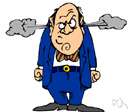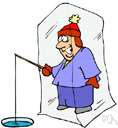become
Also found in: Thesaurus, Acronyms, Idioms, Encyclopedia.
be·come
(bĭ-kŭm′)become
(bɪˈkʌm)be•come
(bɪˈkʌm)v. -came, -come, -com•ing. v.i.
become
When something or someone becomes a particular thing, they start to be that thing. If you become a doctor, a teacher, or a writer, for example, you start to be a doctor, a teacher, or a writer.
If someone or something becomes a certain way, they start to have that quality.
The past tense of 'become' is became.
The -ed participle is become.
When become is followed by a singular noun phrase, the noun phrase usually begins with a determiner.
However, when the noun phrase refers to a unique job or position within an organization, the determiner can be omitted.
The following words can be used to mean 'become'. These words can be followed only by an adjective. Don't use a noun phrase after them.
In conversation, get is often used to talk about how people or things change and start to have a different quality.
In written English, grow is often used to talk about how people or things change and start to have a different quality.
If a dream, wish, or prediction comes true, it actually happens.
Go is used to talk about a sudden change in someone's body.
You say that someone goes blind or deaf.
Go is always used in the phrases go wrong and go mad.
If you want to say that someone or something becomes a different colour, you use go or turn.
In American English, you usually use turn, not 'go'.
Be Careful!
Don't use 'get' or 'become' when you are talking about someone's face changing colour. Don't say, for example, that someone 'gets pale' or 'becomes pale'.
become
Past participle: become
Gerund: becoming
| Imperative |
|---|
| become |
| become |
| Verb | 1. |  become - enter or assume a certain state or condition; "He became annoyed when he heard the bad news"; "It must be getting more serious"; "her face went red with anger"; "She went into ecstasy"; "Get going!" become - enter or assume a certain state or condition; "He became annoyed when he heard the bad news"; "It must be getting more serious"; "her face went red with anger"; "She went into ecstasy"; "Get going!"change state, turn - undergo a transformation or a change of position or action; "We turned from Socialism to Capitalism"; "The people turned against the President when he stole the election" sober up, sober - become sober after excessive alcohol consumption; "Keep him in bed until he sobers up" sober, sober up - become more realistic; "After thinking about the potential consequences of his plan, he sobered up" work - arrive at a certain condition through repeated motion; "The stitches of the hem worked loose after she wore the skirt many times" take effect - go into effect or become effective or operative; "The new law will take effect next month" run - change from one state to another; "run amok"; "run rogue"; "run riot" take - be seized or affected in a specified way; "take sick"; "be taken drunk" break - come into being; "light broke over the horizon"; "Voices broke in the air" settle - become resolved, fixed, established, or quiet; "The roar settled to a thunder"; "The wind settled in the West"; "it is settling to rain"; "A cough settled in her chest"; "Her mood settled into lethargy" |
| 2. |  become - undergo a change or development; "The water turned into ice"; "Her former friend became her worst enemy"; "He turned traitor" become - undergo a change or development; "The water turned into ice"; "Her former friend became her worst enemy"; "He turned traitor"change state, turn - undergo a transformation or a change of position or action; "We turned from Socialism to Capitalism"; "The people turned against the President when he stole the election" transmute, metamorphose, transform - change in outward structure or looks; "He transformed into a monster"; "The salesman metamorphosed into an ugly beetle" suffocate, choke - become stultified, suppressed, or stifled; "He is suffocating--living at home with his aged parents in the small village" nucleate - form into a nucleus; "Some cells had nucleated" turn - cause to change or turn into something different;assume new characteristics; "The princess turned the frog into a prince by kissing him"; "The alchemists tried to turn lead into gold" | |
| 3. | become - come into existence; "What becomes has duration" occur, come - come to one's mind; suggest itself; "It occurred to me that we should hire another secretary"; "A great idea then came to her" root - come into existence, originate; "The problem roots in her depression" take form, take shape, spring, form - develop into a distinctive entity; "our plans began to take shape" arise, originate, spring up, uprise, develop, grow, rise - come into existence; take on form or shape; "A new religious movement originated in that country"; "a love that sprang up from friendship"; "the idea for the book grew out of a short story"; "An interesting phenomenon uprose" make - be or be capable of being changed or made into; "He makes a great host"; "He will make a fine father" | |
| 4. | become - enhance the appearance of; "Mourning becomes Electra"; "This behavior doesn't suit you!" |
become
become
verbbecome
[bɪˈkʌm] (became (pt) (become (pp)))to become sad → ponerse triste
to become ill → ponerse enfermo, enfermar
to become old → hacerse or volverse viejo
to become angry → enfadarse
to become red → ponerse rojo, enrojecerse
we became very worried → empezamos a inquietarnos muchísimo
he became blind → (se) quedó ciego
this is becoming difficult → esto se está poniendo difícil
to become accustomed to sth → acostumbrarse a algo
it became known that → se supo que ..., llegó a saberse que ...
when he becomes 21 → cuando cumpla los 21 años
the building has become a cinema → el edificio se ha convertido or transformado en cine
the gas becomes liquid → el gas se convierte en líquido
to become a doctor → hacerse médico
to become professor → llegar a ser catedrático
he became king in 1911 → subió al trono en 1911
later this lady became his wife → esta dama llegó a ser su esposa más tarde
to become a father → convertirse en padre
what will become of me? → ¿qué será de mí?
whatever can have become of that book? → ¿dónde estará ese libro?
that thought does not become you → ese pensamiento es indigno de ti
Become + adjective
Become + noun
become
[bɪˈkʌm] [became] [bɪˈkeɪm] (pt) [become] [bɪˈkʌm] (pp)to become thin → maigrir
to become angry → se mettre en colère
to become stronger → s'intensifier
to become interested → commencer à s'intéresser
it became known that → on apprit que
become
pret <became>, ptp <become>become
[bɪˈkʌm] (became (vb: pt) (become (pp)))to become famous → diventare famoso/a
to become fat/thin → ingrassare/dimagrire
to become angry → arrabbiarsi
to become accustomed to sth → abituarsi a qc
to become a doctor → diventare medico
it became known that → si è venuto a sapere che